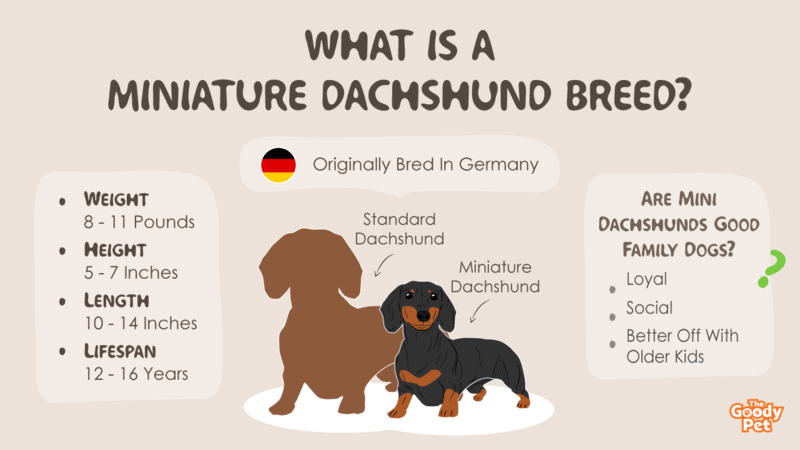When it comes to keeping pets, the miniature Dachshund breed is one of the most popular dogs. Though tiny, this pooch has much to offer your family. So what is a miniature Dachshund breed?
Nicknamed “weiner dogs or badger dogs,” Miniature Dachshunds were originally bred in Germany. They are about 11 pounds in weight, up to 7 inches in height, and can live for up to 16 years. As for temperament, they are high-spirited as well as intelligent and independent.
Nevertheless, a miniature Dachshund is susceptible to back problems. In this article, we will look at this and other health problems that may affect your furry friend.
As with any type of dog, you need to know everything from temperament to health issues related to your pet. We will tell you about all that in a bit, including how much you should pay for this mini doggie. For now, though, let’s look at what makes a mini Dachshund.
What Makes A Miniature Dachshund?
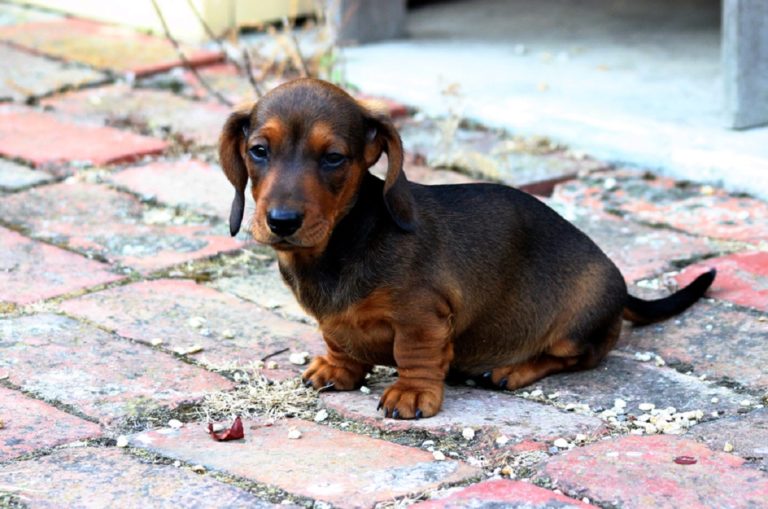
Mini Dachshund is a dog breed whose roots go back to Germany where it was developed to hunt foxes, hares, and badgers.
Actually, their name, Dachshund, is derived from the German words, dach (badger) and hund (dog).
Length
So, how long do mini Dachshunds get?
The breed has a long back that is normally twice its height when measured from the tail’ base to the breastbone.
An adult miniature Dachshund grows to a height of 5-7 inches. As such, Miniature Dachshunds are about 10 to 14 inches long.
These measurements are usually taken at around 15 months, the age at which most dogs reach adulthood.
However, since these are teacup dogs, your pup may reach maturity much earlier at around 9 months.
Weight
When it comes to size, miniature Dachshunds typically weigh between 8 and 11 pounds. The breed is characterized by short legs and a long muscular body.
Their energetic look is made even more prominent by dark eyes and a tapered muzzle. A Dachshund’s neck is long and slightly arched, resting on broad shoulders.
Despite their peculiar look, mini doxies are well balanced and very agile in their movement.
An elongated head, soulful eye, and droopy ears coupled with a long body give doxies a comical look. The funny look is also enhanced by a large chest and a sturdy tail.
Comparison
The breed comes in 2 sizes; the standard and the miniature.
A standard doxie can reach around 16-32 pounds in weight, 21-25 inches in length, and 13-14.5 inches in height.
Basically, double the size and weight of a mini Dachshund.
Are Mini Dachshunds Good Family Dogs?
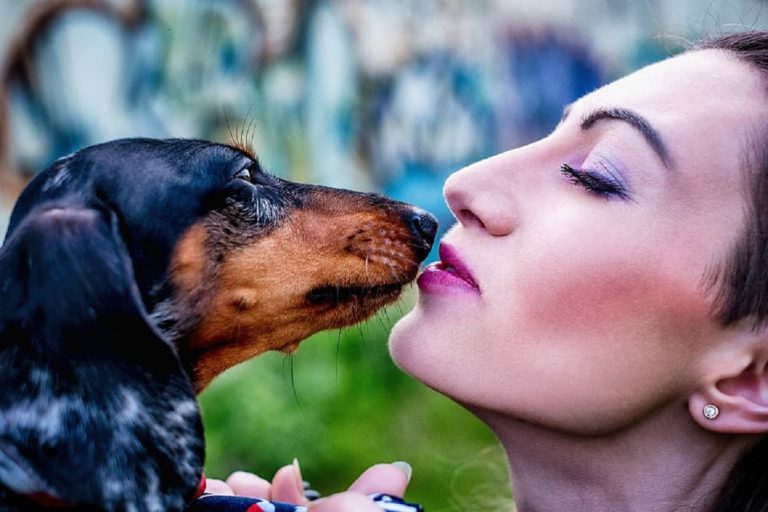
As we have noted, these pups are no longer kept for hunting, raising the question; are mini Dachshunds good family dogs?
Miniature Dachshunds are great family pets with a lovable, friendly, and curious temperament.
The breed is also known for being clever and fast in adapting to a new environment.
Here are some notable traits of doxies.
Loyal
Dachshunds do like to cuddle but will, for the most time, enjoy being independent. This can sometimes make your fido come off as aloof.
Worry not though.
To their owners, doxies are loyal and will cozy up to you when they want to be petted, fed, or taken for a walk.
Social
Do you spend long hours away from home?
Miniature Dachshunds cannot be left alone for a whole day.
Dachshund puppies need to relieve themselves every 2 to 3 hours while adults use the toilet about every 4 hours.
If left alone for more than 4 hours, they develop separation anxiety and may result in undesirable behavior.
Better Off With Older Kids
When it comes to children, these doggies relate better with older kids.
With younger kids, your fido may feel overworked, irritated, and may even get their long backs injured by certain play.
That’s not to say Dachshunds can’t cope with children. The trick lies in teaching your kids how to play with the dog.
They should not lift the dog, but rather keep their activities on the ground.
You should discourage any kind of play that involves jumping up and down or climbing up furniture since that’s how most mini Dachshunds hurt their back.
Miniature Dachshund Temperament
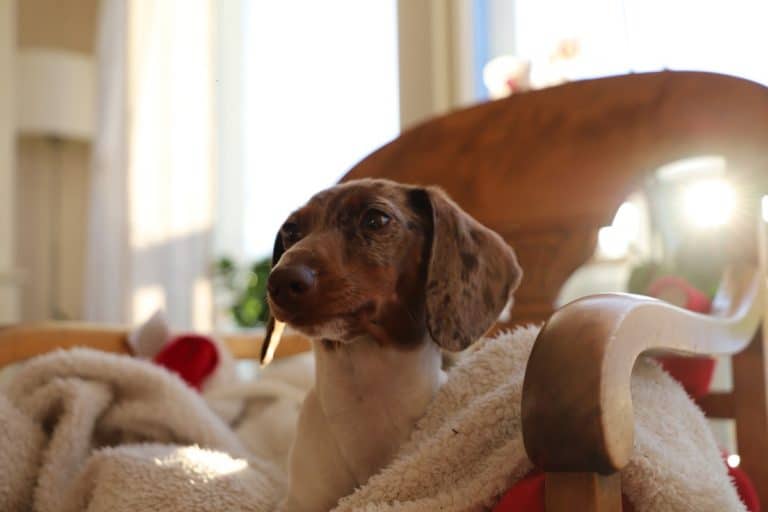
Different breeds come with unique temperaments and miniature Dachshunds are no different.
Together with adorable looks, badger dogs are known for their high-spirited and keen intelligence. Right from a young age, Dachshunds are even-mannered and with the right environment, they can carry the personality to adulthood.
Jealous
So, are Dachshunds jealous dogs? Dachshunds are fiercely loyal, a trait that comes with lots of jealousy.
As a matter of fact, they get aggressive when their owners shift attention to other pets or people.
Your pup will also not enjoy sharing toys or anything they consider personal property including sleeping mats and feeding bowls.
Bark
In particular, mini Dachshunds do bark a lot when they are jealous or feel threatened.
They bark to scare away strangers and draw your attention back to them. Intense barking is also a way of letting you know that your canine buddy is lonely, bored, or in need of exercise.
To ensure that miniature Dachshunds do not bark a lot, minimize the anxiety triggers. For example, exercise them for at least 30 minutes every day and get them a device to talk to them when you are away from home.
Explorer Nature
With a short and sleek build, mini Dachshunds were bred to hunt prey both over and underground. The practice is all but forgotten though and Dachshunds are now indoor pets.
On the other hand, given a chance, these doggies will dig burrows in your backyard. So, if you have planted flowers or a kitchen garden, better keep your furry friend away from it.
Hereditary Personality
Like other pets though, temperament in doxies is subject to several factors including heredity, age, socialization, and training.
Based on heredity, there is anecdotal evidence that wirehaired Dachshunds are mischievous and trouble-seeking.
On the other hand, longhairs tend to be quiet and peaceful while shorthairs fall somewhere in the middle.
We will look at the different types of Dachshunds in a while.
Do Miniature Dachshunds Have Health Problems?
This is one doggie that is known to live long.
Mini Dachshunds live for 12 to 16 years on average.
Don’t underestimate your doxie though, Chanel, a Dachshund in New York lived to be 21 years old!
Unfortunately, the lifespan of a miniature Dachshund can be significantly reduced by various health problems that it is genetically predisposed to.
Obesity
Obesity results from either overfeeding or not exercising your dog. With extra weight and such a long torso and tiny legs, your pooch will experience a host of joint and back problems.
On the other hand, feeding your dog on high protein and low fat/carb foods like Visionary Keto Dog food.
This ketogenic dog food is formulated without any grains or added sugars that can raise your dog’s blood sugar levels, increasing their risk of getting diabetes.
Low carb dog food also helps in prevention of obesity-related problems like Intervertebral Disc Disease (IVDD), heart problems, and osteoarthritis.
IVDD
The most common health problem in Mini Dachshunds is the Intervertebral Disk Disease (IVDD), a back problem that affects more Dachshunds than other dog breeds.
Due to the elongated torso and short legs caused by a skeletal disorder known as Chondrodystrophy, their vertebral discs are predisposed to break or rupture easily under pressure.
Lack of exercise, extreme jumping up or down, or positions that don’t support both the rear and front ends of the spine put your dog at risk of IVDD.
The risk of IVDD is exponentially increased if your canine companion is obese.
Other Health Problems
Other health problems your mini dog is likely to encounter include hips dysplasia (hip dislocation), Patellar luxation (knee dislocation), and eye problems like Progressive Retinal Atrophy (PRA) and cataracts.
What Are The Different Types Of Dachshunds?
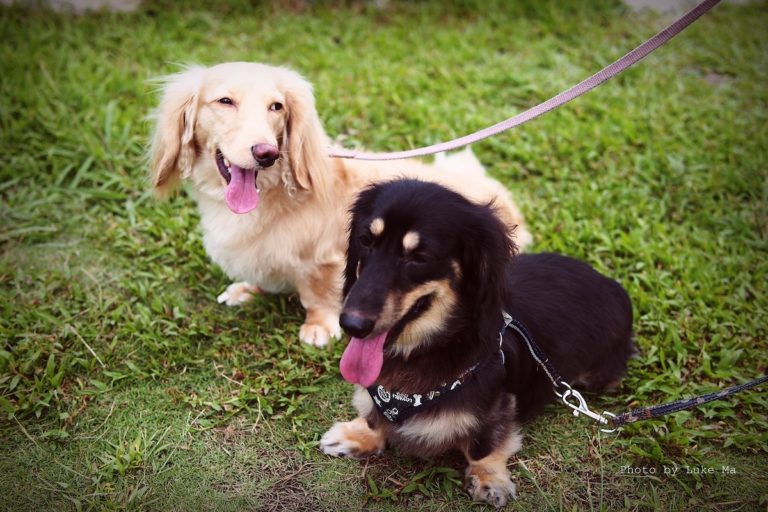
Dachshunds come in many different coat colors and patterns, like the dapple, brindle, piebald and many more.
In fact, there are up to 25 different variations!
For this article, we will focus on the 3 different fur types: Smooth, Wirehaired, and Longhaired.
Smooth-Haired Dachshunds
Smooth Dachshunds is the variety mostly found in the US. Their coats are short, soft, dense, and shiny. As such, they require little in terms of grooming. On average, they only need to be bathed once a month. With less undercoat than the other types, smooth doxies shed the least and only need a once a week brushing to remove dead hair.
Shorthairs are the best variety for dog owners with vast grounds where it’s okay to burrow. Thankfully, their coats do not hold much dirt and are easy to clean.
Long-Haired Dachshunds
Long-haired Dachshunds come with long and silky hair. The coat can be wavy or straight and longer on the tail, ears, legs, and body. They require frequent grooming with special care on the fur under the belly where dirt collects easily.
Of the three varieties, longhairs are calmer. They are also better suited for cold climates due to the thick undercoats. However, having thick undercoats means that they shed a lot. To keep their fur free of mats and dirt, brush them daily.
Wire-Haired Dachshunds
Wire-haired Dachshunds have thin undercoats and bristly, rough outer coats, hence their characteristic name. Apart from the ‘hot dog’ body that is a defining feature to all doxies, the wirehaired variety has unique bushy eyebrows and beards.
Just like longhairs, wire-haired doxies require daily brushing to prevent mats from forming. Additionally, you need to strip and pluck their undercoats. It may also be necessary to clip the wiry fur for an even look.
Related Questions
How Much Should I Pay For A Miniature Dachshund? To get a Mini Dachshund, you should be prepared with about $200 to $3,500 or more. That is such a wide range, right? Apparently, there’s no standard price for a mini doxie. A puppy’s demand, color, coat texture, pedigree, and where you choose to buy, greatly influence the cost.
Are Miniature Dachshunds Easy To Train? Miniature Dachshunds are considered hard to train. They are naturally stubborn and independent thinkers as they were bred to detect and hunt down badgers. Nevertheless, training a Dachshund gets as easy as training any other dog with patience, consistency, and firmness. This is also enhanced by the fact that they are smart and willing learners.
What Size Crate Should I Get For A Miniature Dachshund? The best crate for a Miniature Dachshund should be 24”. This is enough space for your furry bundle to lie down, stand, sit, and turn about comfortably yet not big enough to encourage pooping/peeing space. A Crate like Amazon Basics Pet Crate With Tray will suit an adult Dachshund or a puppy.

